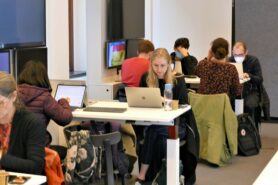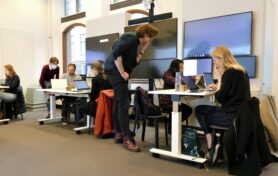On the 20th of May, the Living Lab Digital Humanities will open in the University Library City Centre. Prof. Dr. Hugo Quené, Professor of Quantitative Methods of Empirical Research in the Humanities, talks about this cooperation between the Centre for Digital Humanities and the library.

What is the Living Lab Digital Humanities?
The Living Lab Digital Humanities will be a physical workplace for digital research and education in the humanities. Researchers, data experts and software experts will come together to work on a project. Digital, data-based research requires the combination of various expertise’s, and the Living Lab DH offers the facilities for this. There will be four workstations, each suitable for cooperation and consultation with 4-5 people. There will also be trainings and practical exercises offered, to learn how to work with digital sources and methods.
How does it work?
As a researcher, you can come and ask questions about your digital sources (text, corpora, video, speech, data…) and about the tools and methods you want to use. Together with DH-support of the university library with expertise in the field of data, collections, access and digitisation, the Centre for Digital Humanities (CDH) and with the software developers (of DH-IT Humanities and of Information and Technology Services UU-ITS) we explore the possible routes. If the solution is simple, you will be helped immediately with an answer or with a reference to where the answer can be found. If the question is more complex, then the answer will require more effort, for example, to develop a computer programme, or to unlock other sources, or to combine data. You can also visit Living Lab DH to get acquainted with (for you) new methods such as ‘text mining’, without having to install or adapt anything on your own computer.

Why now especially for the humanities?
Data are extremely important, the amount of data is increasing explosively, and the importance of data is growing more and more. We call this the ‘computational shift’ in the humanities. This change calls for greater data literacy and better digital literacy in the humanities. The Living Lab DH offers help to teachers, researchers and students to achieve this. And this is sorely needed, because eventually everyone in the humanities will have to be able to work not only with texts but also with other types of data. |
Some facilities already exist: in the Utrecht Digital Humanities Lab researchers and teaching staff have long been able to answer questions about software and digital data and to develop software; the data manager can answer questions about storage and management of data; and statistical consultation is available for linguists. Utrecht University Library has also been offering all kinds of advice for years. Now all this expertise is being made more accessible. The Living Lab DH offers facilities that are of interest to everyone, including people outside the humanities, and which are also closely linked to the digital collections of the library. Both the library and the Centre for Digital Humanities wanted to set up such a lab, so it is logical to cooperate.

You are the founding director of the Centre for Digital Humanities. Can you tell us more about that?
In the spring of 2020, the Faculty of Humanities established the Centre for Digital Humanities (CDH). Experts from the Utrecht Digital Humanities Lab, the Utrecht Data School, the Utrecht Institute of Linguistics Labs, and the IT experts from the DH-IT chain will work together. The CDH’s mission is to “strengthen the digital and computational perspectives on the humanities”. Lecturers and researchers in the CDH work closely with the data experts, the software developers, and others, to promote this computational turn in research and education.
“It is important that more teachers and researchers become ‘digitally literate’, so I hope that in the coming years as many teachers and researchers as possible will find their way to the Living Lab.”
How does a physical meeting place work in times of coronavirus measures?
We all now work at home as much as possible, and only meet online. But some tasks are not possible at home, due to technical limitations (data traffic, computing capacity, etc.), and for those tasks employees can then use the facilities in the Living Lab DH. For the time being, only by appointment, and of course according to all corona measures. Of course, the Living Lab DH will also be set up for online cooperation, and for streaming of what happens in the lab. For now, an online programme is in the making. And in the meantime, we are looking forward to a time when more will become possible.
When do you consider the Living Lab DH a success?
I see it as a success if it becomes a lively workplace, where people with very different expertise work together and help each other. A place you go to for technical help, but also if you need inspiration about digital sources and methods, and if you are looking for critical reflection on them. It is also important to me that more teachers and researchers become ‘digitally literate’ than is currently the case, so I hope that in the coming years as many teachers and researchers as possible will find their way to the Living Lab DH.

